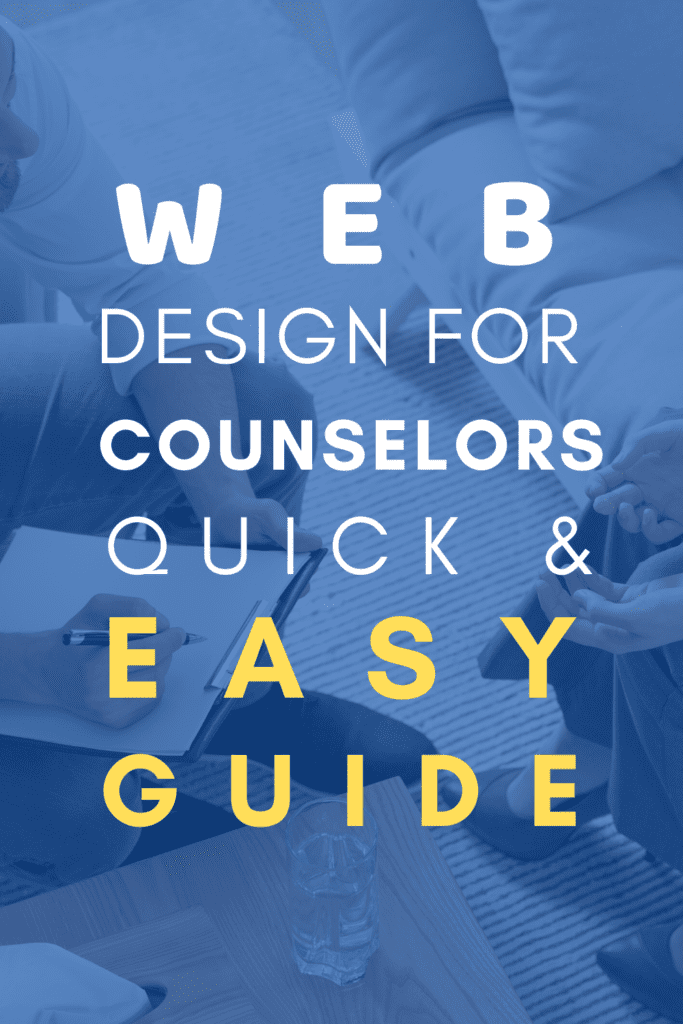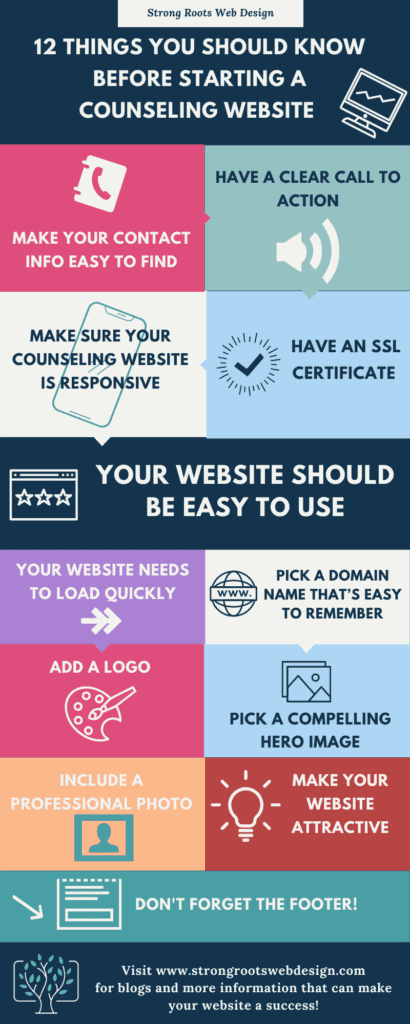
Branding Your Mental Health Private Practice

Are you establishing a mental health private practice? Are you hoping to gain more clients?Here’s a method to build a solid private practice brand: Capture. Build trust. Give hope.
Learn how to build your mental health private practice brand using a website

Your brand is what your clients and others say about you. Establishing a website helps you establish your brand. What do you want clients and others to say about you? Use your website to capture and develop trust with potential clients and build trust with current clients. Your website should show you as an expert so clients who come looking know you can help them.
You don’t want a website that drives potential clients away before they talk with you.
This article will break down two main aspects of building your private practice brand: design and content.
DESIGN

Designing your private practice website is about establishing yourself as a trustworthy professional who can help with a potential client’s problem.
A user-friendly website with a clean design helps you achieve this.
1. Accessibility and Usability
A critical first step for any company is ensuring your website is easy to use and accessible to potential clients. You want their impression of you to be positive, and you want them to reach out to you. If your website is hard to navigate or doesn’t view well on a cell phone, potential clients aren’t likely to stick around to become actual clients.
If you have social media links to your Facebook page or Twitter, avoid placing them at the top of your website — you don’t want to distract some readers by encouraging them to click off your website.
2. Color Palette
Your brand’s color palette should be consistent throughout your website and all other marketing materials, including social media.
Create a crisp color palette by selecting one core color as your primary brand, one complementary color, and one contrasting color for content you need to stand out, such as a Call to Action or website button. When considering the text, legibility is essential — choose two shades of black or gray.
3. Imagery
Creating your brand also requires considering the images you use to market your practice. Photographs and images play a significant factor in the overall feel and polish of your branding. You have several options for website images, including stock photos, hiring a professional photographer, or taking pictures yourself. Include images of your office space to give potential clients a peek at what to expect. If you choose stock photos, check licenses for any images you use. If you plan to use images of people, consider whether the images represent your patients as accurately as possible. You’ll want the diversity of your clientele reflected in the photos on your website and marketing materials.
One more note on images: your clients may come to you with their worries, but your website is the space where you inspire hope. Consider using images that convey happy or hopeful people rather than gloomy people. Whichever you choose, make sure to use high-resolution, high-quality, professional-looking images. And keep in mind that while you’re aiming for professionalism, the photos on your site should appear natural, not staged.
CONTENT

When providing information to potential or existing clients, remember that as a therapist, you’re building your brand as someone your patients can trust.
1. Testimonials
One way to establish trust in your health care practice is to provide potential and existing patients with social proof. Information on your website should communicate that you are an expert.
- Include client testimonials so your potential clients can read reviews from your current clients. Testimonials increase your potential clients’ confidence that you can help them with their problems. Of course, as a health provider, confidentiality is essential, so include client testimonials without names or images. Instead, speech bubbles help frame a testimonial as a text from a client without providing identifiable information.
- Testimonials from colleagues are also powerful. Having another expert in mental health or a related field speak to your capabilities will reassure your potential clients. Experts like you have authority, and clients are likely to trust the professional opinion of this authority. Confidentiality is not a factor when sharing a testimonial from a colleague. So, you can include their image and name along with their testimonial. You could even ask a colleague to record a video testimonial. You might also support your colleague by doing the same in return.
- Reach out to workshop attendees. If you have ever hosted a workshop, reach out to attendees to ask for a review. Workshop attendees who can speak to your value also reassure potential clients.
- Include a video of yourself — a 60-to-90-second introductory video about what you do and your approach can give insights to potential clients. By sharing a little about yourself, you build trust. Clients get a sense of your personality and connect with you.
2. Answer Potential Questions
Your website should answer your potential client’s questions before they enter your office and even before they book an appointment. Be concise. Use a warm tone and phrases that evoke trust, hope, and warmth. Try to answer the following questions:
- Who are the providers at this practice?
- What is your expertise? List them. Clients want to know if you can help with their particular concerns.
- How can you, as a provider, help?
- Why should a client choose your practice? What’s so unique about what you offer?
- What techniques do you use?
- What is your pricing? What insurance do you accept?
Follow these tips, and you’ll create a website that builds trust with potential and current clients.
Did you like this post? Share it!
Related Reads for Starting A Therapy Business
- Counseling Practice Names for Branding and Website
- How to Start a Therapy Practice Online- How To Offer It Successfully
- How to Choose Your Therapy Niche and Get More Clients
- Are Paid or Free Therapist Directories Worth It? A Definitive Guide
- How to Create A Therapist Directory Listing that Gets You Results
- What You Need to Know About Starting a Telehealth Private Practice
- Importance of Getting Professional Design Services for Counseling Websites
- 31 Engaging Content Prompts For Your Therapy Biz
- Branding Your Mental Health Private Practice
- Your Therapist Logo: The Ultimate Guide
- Quotes for Therapists – Inspirational and Uplifting Quotes for Therapists
- 10 Therapist Podcasts You Should Be Listening to in 2024
- Starting a Private Practice in Counseling!
- 12 Things You Should Know Before Starting a Counseling Website
- Finding Joy in Your Practice: 4 Things to Learn from Donald Altman
- Therapist Logo Ideas – Find Inspiration in the World Around You!
- Eight Questions to Ask Yourself When Starting Private Practice in Psychology
- Secure Website Design for Mental Health Professionals
- Best Ways to Drive Traffic to Your Blog
- Is It Worth Making a Website for a Small Business?
Need any of the following? Contact us!
Here are some Sample Websites We’ve Created:
Check out our Portfolio for more!
Hi! I’m Sarah.
I help counselors and therapists have a bigger impact on the world through better client connection. I do this by creating beautiful visuals and strategically designed websites.

















